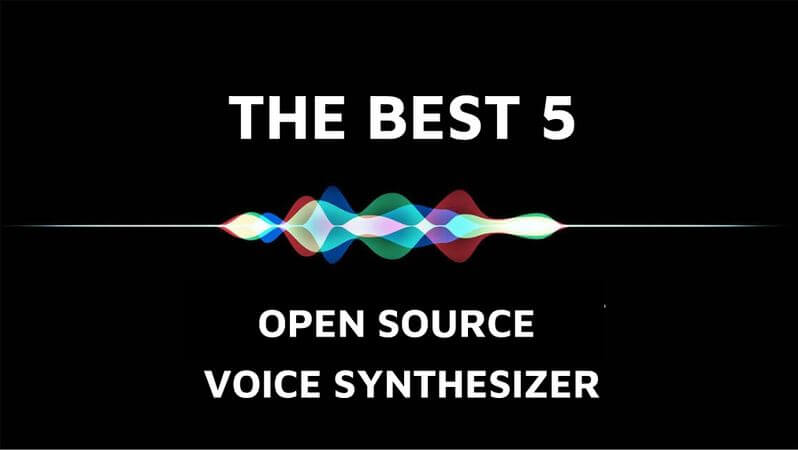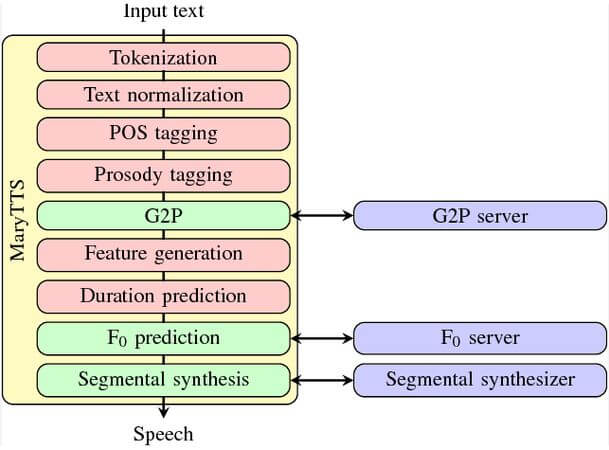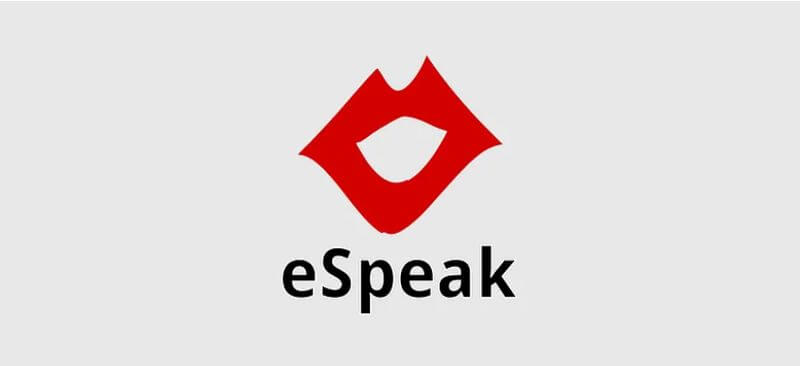Not all voice synthesizers are open source. For instance, Google Text to Speech (TTS) provides a API for developers but does not operate under an open-source license. In this blog we'll cover open source voice synthesizer and common tools for open source text to speech in detail, and also recommend a more convenient and time-efficient TTS engine.

- Part 1. Baisc Info of Open Source Voice Synthesizer & Open Source TTS
- Part 2. 5 Best TTS Engines for Open Source Voice Synthesis
- Part 3. Applications of Speech Synthesizer
-
Part 4. Challenge of Using Open Source Voice Synthesizer

- Part 5. A Better Way to Get Voice Synthesis
- Part 6. Hot FAQs about Open Source Voice Synthesizer & Open Source TTS
Part 1. Baisc Info of Open Source Voice Synthesizer & Open Source TTS
1) What Does Open Source Text to Speech Mean?
"Open source” means "give anyone access to the software's source code”. This openness encourages collaboration because it allows developers to research, adapt, and share software as needed. Continuous improvements from the developer community drive the iterative development of the software, enhancing its reliability and adaptability.
In the field of voice synthesis, open source covers publicly accessible tools and libraries that provide features such as text-to-speech (TTS) and speech transcription.
Open source encourages global collaboration to improve the systems. Therefore, it plays an important role in driving the development of speech synthesis technology.
2) What Is Open Source Voice Synthesizer?
Voice synthesis, also known as text-to-speech synthesis, is a technique that converts written text into spoken language, enabling accessibility for applications. It can help visually impaired users, or provide real-time narration in multimedia applications.
Open source voice synthesizers are usually developed by the developer community and released under an open source license, allowing anyone to freely use and modify the software.
Part 2. 5 Best TTS Engines for Open Source Voice Synthesis
1. MaryTTS (Mary Text-to-Speech) - Open Source TTS

MaryTTS is an open-source TTS system written in Java. It offers multilingual support and allows users to customize voices.
-
Pros: Provides a lot of flexibility. With its highly customizable features, developers can customize it extensively to meet their needs, including creating parsers, processors, and synthesizers. This makes it easy to integrate into a variety of platforms and applications.
-
Cons: Because of its high level of customization, integration can take some time for developers who aren't familiar with text-to-speech technology.
2. eSpeak

eSpeak is a compact and lightweight TTS engine available under the GPL license. It supports multiple languages and provides various voices with adjustable parameters.
-
Pros: User-friendly, easy to use.
-
Cons: Limited features, and written in C.
3. Flite (Festival Lite)
Flite is a small and fast TTS engine derived from the Festival Speech Synthesis System. Suitable for embedded systems and resource-constrained environments.
-
Pros: Designed to be compact and efficient, making it suitable for resource-constrained environments.
-
Cons: Has fewer voice options compared to other TTS engines, limiting user choice.
4. Mozilla TTS - Open Source Text to Voice
Mozilla TTS leverages deep learning for natural speech synthesis. Modular architecture enables customization, supporting multiple languages. It utilizes modern neural network architectures, particularly sequence-to-sequence models.
-
Pros: Free to use.
-
Cons: Limited language support.
5. Festival Speech Synthesis System
Festival is a general-purpose TTS system developed at the University of Edinburgh. It offers support for multiple languages and allows users to create custom voices through voice building tools.
-
Pros: Highly customizable.
-
Cons: Due to its high customizability, it's difficult to use for beginners.
Part 3. Applications of Speech Synthesizer

The applications of speech synthesizers are vast and varied, but here are 3 main ones:
Virtual Assistants:
Virtual assistants like Siri, Google Assistant rely heavily on speech synthesizers to interact with users through spoken responses, providing information, performing tasks, and executing commands.
Content Creation Tools:
Speech synthesizers play an important role in content creation. It helps video creators quickly generate voiceovers by using , which not only saves time, but also provides a variety of language and voice options, making both videos and the voiceovers more engaging.
Automatic Voice Response Systems (AVRS):
Many telecommunications systems and customer service platforms utilize voice synthesizers for automatic voice response, allowing users to interact with the system via voice commands or responses.
Part 4. Challenge of Using Open Source Voice Synthesizer
While speech synthesis open source can save costs and provide greater flexibility for customization, there are some challenges with using these engines that can't be ignored:
1. Limited Language And Voice Support
Many opensource text to speech have limited language support compared to non-open source ai voice generators. This limitation can be a barrier for users who have a high demand for voice and language diversity.
2. Customization and Extensibility
While open source AI TTS offers the flexibility to customize and extend functionalities, implementing specific features or adapting the voice synthesis to different languages or accents may require advanced programming skills. This can be a challenge for individuals or organizations without the relevant technical skills.
3. Consideration of Cost
While text to voice open source engines are free to use, they may require additional resources and time to implement. As mentioned in the second point, companies may need to hire or train engineers or analysts with TTS engineering knowledge. Open source voice synthesis may cost much in the long run.
4. Documentation and Support
Open source projects may have limited documentation and community support compared to commercial solutions. Users may struggle to find comprehensive guides, troubleshooting resources, or timely assistance when they encountering issues.
5. Security
Since open-source text to voice is developed and maintained by a community, there may be concerns about security.
Part 5. A Better Way to Get Voice Synthesis
VoxBox - The Best Speech Synthesizer
A high-quality speech synthesizer, even if it is not open source, will save time and effort while satisfying the user's needs well. VoxBox is one such voice synthesizer with the best TTS models.

Top Features
-
VoxBox provides 3200+ synthesizer voices with the highest quality in 77+ languages.
-
Access to 100+ accents, so users don't have to worry about accent adaptation.
-
Can be voice synthesizer of any characters, such as Yoda voice synthesizer and Arkham knight voice synthesizer, etc.
-
Not only a TTS engine, but also a voice cloner, AI rap generator and more. Allowing you to do voice overs with the celebrity voices you want.
-
Provide AI intelligent assistant to help polish your script according to your chosen use scenario and emotion, just like ChatGPT, but more accurate.
-
Pause, Pitch, Speed and Emphasis to perfect the speech synthesis.
Part 6. Hot FAQs about Open Source Voice Synthesizer & Open Source TTS
1. How do you generate synthetic voices?
You can do this using the best TTS open source AI voice generator mentioned earlier, but that can have a lot of obstacles. Using VoxBox directly to synthesize the voice you want will be much easier and faster.
2. What is the best open source TTS model?
We have recommended 5 best TTS open source models in Part 2: MaryTTS, eSpeak, Flite, Mozilla TTS, Festival Speech Synthesis System. They each have advantages and disadvantages, and users can choose according to their needs.
3. What is the best TTS for Chinese?
VoxBox. VoxBox supports 77+ languages and 100+ accents, uses advanced speech synthesis technology to generate natural and smooth Chinese speech, making the synthesized voice sound more natural.
4. Is there a free TTS?
Yes. VoxBox has a free version for trial, including 2000 characters count and lots of voices.
Conclusion
Each tool has its advantages and disadvantages. Open source voice synthesizers provide developers and users with a free and customizable platform. They often contain pre-trained models that support machine learning and deep learning techniques. However, setup and use may require technical knowledge. In addition, some may not be as good as a fully functional commercial speech synthesizer in terms of quality, consistency, or language support.































